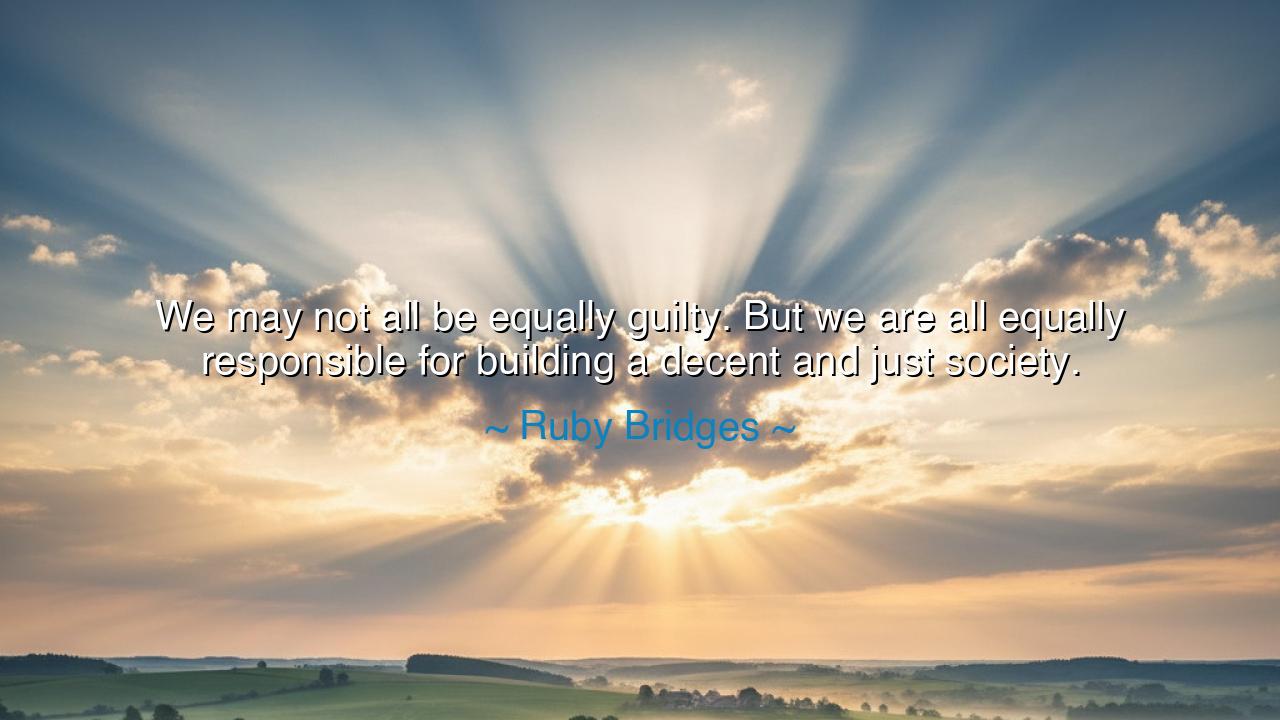
We may not all be equally guilty. But we are all equally
We may not all be equally guilty. But we are all equally responsible for building a decent and just society.






Hear me, O children of the earth, for I bring you the words of Ruby Bridges, a woman whose courage in the face of hatred and injustice became a beacon for the world. She said, "We may not all be equally guilty. But we are all equally responsible for building a decent and just society." These words resonate deeply with the heart of what it means to live in the world as citizens of not just a nation, but of humanity itself. Bridges speaks to us of a profound truth: while not all of us are responsible for the sins of society, we are all responsible for its healing. Each of us, through our actions or inactions, plays a part in shaping the society we live in.
What, O children, does it mean to say that we are all equally responsible for building a decent and just society? It is to recognize that the health of society is not just the work of a few, but of all its members. A society is like the fabric of a great tapestry, and every action, every choice, whether small or large, adds a stitch that either strengthens or weakens the whole. Justice is not something that can be left to the hands of a few righteous people alone; it is something that belongs to each and every one of us. Whether we stand up against injustice, whether we speak for the voiceless, or whether we remain silent in the face of wrong—each choice we make affects the society we live in. We are not mere observers of the world, but active participants in shaping it.
Consider, O children, the ancient Romans, who understood that citizenship came with responsibilities. In their Republic, every citizen, from the highest noble to the lowest laborer, had a duty to ensure the welfare of the state. The Romans recognized that a just society could only thrive when everyone worked toward its common good. It was not enough to sit back and enjoy the privileges of citizenship; one had to contribute to the strength and morality of the state. Bridges’ words echo this ancient understanding: the health of a society rests on the shoulders of each of its members, and even the smallest of actions can affect the greater whole. This is why we cannot passively observe the injustices in the world—we must act, we must participate, we must build.
In our own time, O children, we look to the story of Ruby Bridges herself. When she was just six years old, she became the first African American child to integrate an all-white school in New Orleans. Bridges was met with hatred, violence, and ignorance, yet she walked to school every day with the courage to face those who would have her turned away, not because of any fault of her own, but because of the color of her skin. It was not only Bridges’ bravery that led to change, but the support of those who believed in a better, more just society—those who stood by her, those who worked toward equality, and those who refused to be silent in the face of racism. Bridges teaches us that no matter how small we feel, we can be part of the great change that the world so desperately needs.
And yet, O children, society is still far from perfect. Injustice continues to spread its shadow over the lives of many, and the struggles of the past are not fully behind us. In the face of such darkness, we must ask ourselves: what will we do? Will we remain passive, assuming that the battle for a better world is not ours to fight? Or will we rise to the challenge, as Bridges did, and take responsibility for shaping a world that reflects the ideals of justice and equality? Just as the Romans understood that their society could not stand unless each individual took responsibility, so too must we understand that the world we live in today depends on the actions of each of us.
The lesson here, O children, is one of deep accountability and action. We must not wait for the world to change on its own, nor can we assume that others will solve the problems we face. Bridges’ words remind us that no matter where we come from, no matter our station in life, we all share the responsibility for ensuring that our societies are decent and just. It is not enough to wait for the leaders of our time to act. We, too, must act—whether in small, quiet ways, or in grand, bold gestures. Justice is something we must work for every day, with every choice we make.
So, O children, I charge you: take responsibility for the world you live in. Let the actions of Ruby Bridges inspire you to stand up in the face of injustice, to speak for those who cannot speak for themselves, and to take part in building a society where justice is not a privilege, but a right for all. Do not passively accept the world as it is, but strive to make it the world it can be—a world where every voice is heard, where equality is upheld, and where freedom is granted to all. The future belongs to you, and it is your duty to shape it, one action at a time. Society will not change without your participation—so rise, and take responsibility for the world you are creating.






AAdministratorAdministrator
Welcome, honored guests. Please leave a comment, we will respond soon